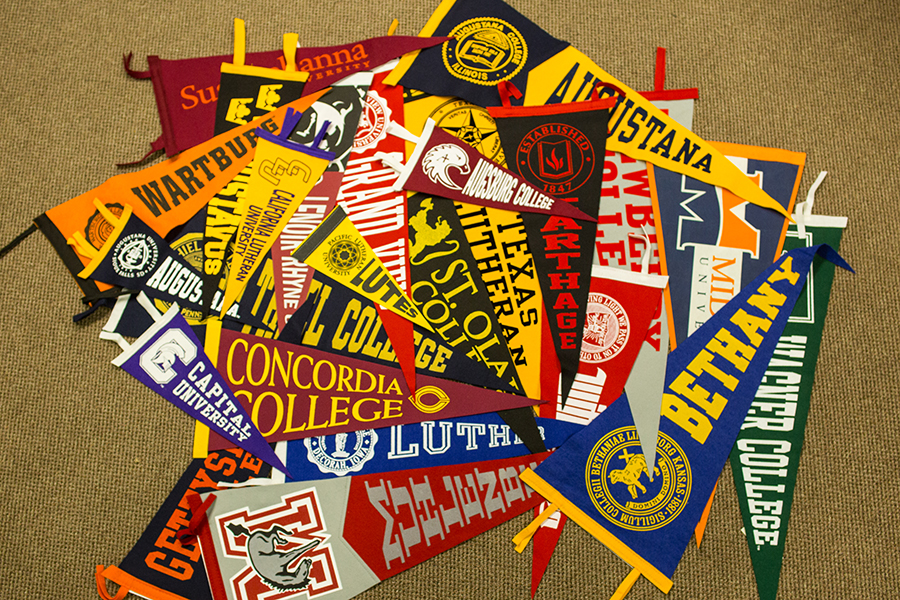This page offers information about the colleges and universities of the ELCA and their association, the Network of ELCA Colleges and Universities (NECU), for both the general public and leaders of NECU institutions.
The information and the links below are primarily for NECU leaders, though others interested to learn more about the mission of the Network of ELCA Colleges and Universities are invited to use them as well. Presidents’ offices may update their cabinet/senior leader records by clicking the “Update Senior Leaders and Key Contacts” button.
NECU is composed of the 26 colleges and universities of the ELCA, the one college of the Evangelical Lutheran Church in Canada, and the ELCA’s churchwide organization through the Christian Community and Leadership home area. See the “Find a School” section below for the names and locations of the 27 NECU member institutions of higher education.
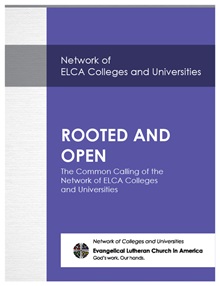
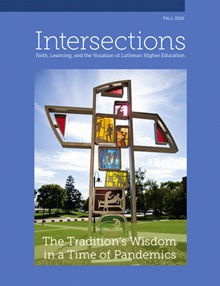
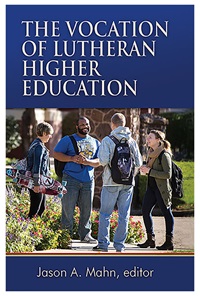
Format: In-person
Dates: August 10, 2022
Location: Columbus, Ohio
Time: 12 noon – 7 pm ET
Registration: To be announced
Format: In-person
Dates/Times: July 18, 4 pm CT – July 20, 1 pm CT
Location: Augsburg University, Minneapolis, Minnesota
Theme: “Why All This Talk about Understanding the Mission of NECU Member Institutions as a Vocation?”
Registration and Schedule: https://www.augsburg.edu/campusministry/2022/04/27/2022-vocation-of-a-lutheran-higher-education-conference-registration/
Format: In-person
Dates/Location: August 8-10, 2022, Wittenberg University, Springfield, Ohio
Host: President Michael Frandsen
Registration: To be announced
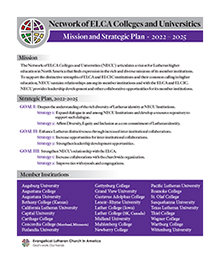
NECU’s Board of Directors approved a mission statement for NECU and a strategic plan for 2022-2025 at its annual meeting on January 4, 2022. The strategic plan has three goals:
NECU GOVERNANCE
The Network of ELCA Colleges and Universities (NECU) is an unincorporated, missional collaboration between the ELCA’s churchwide organization and the ELCA’s colleges and universities. The sole college of the Evangelical Lutheran Church in Canada (Luther College, Regina, Saskatchewan) is also a member of NECU.
EXECUTIVE COMMITTEE
Seven college/university presidents, the executive director of Christian Community and Leadership in the ELCA’s Churchwide Organization, and NECU’s executive director constitute NECU’s executive committee. Members for 2022 are:
PRESIDENTIAL RELIGIOUS REQUIREMENTS SURVEY
Each NECU institution was asked in December 2020 whether its president was required to be a member of the ELCA or meet other religious requirements. The results follow.
AUGSBURG UNIVERSITY
The president must be a member of an ELCA congregation.
AUGUSTANA COLLEGE
The president of the college shall demonstrate a firm commitment to advancing the welcoming Lutheran tradition of higher education as expressed in the college’s mission statement and Five Faith Commitments (2015). The president, together with the trustees, shall actively affirm and nurture the college’s relationship with the ELCA, including through active participation and leadership in the Network of ELCA Colleges and Universities.
AUGUSTANA UNIVERSITY
The president shall be a member of a Lutheran congregation.
BETHANY COLLEGE
The college president shall be or become a member of a congregation of the Evangelical Lutheran Church in America.
CALIFORNIA LUTHERAN UNIVERSITY
The president of the university shall be a person with demonstrated experience in higher education and the work of the church and shall usually be a member of the ELCA or its successors.
CAPITAL UNIVERSITY
No requirement.
CARTHAGE COLLEGE
The president shall be a member of an ELCA congregation or a congregation or church body in full communion or in bilateral conversations with the ELCA.
CONCORDIA COLLEGE
The president of the college shall be a member of the Lutheran Church.
FINLANDIA UNIVERSITY
The president is required to be a Lutheran.
GETTYSBURG COLLEGE
No requirement.
GRAND VIEW UNIVERSITY
The president of the university shall be Lutheran and/or willing and able to understand, appreciate, articulate and preserve the university’s practices and values that are rooted in its Lutheran heritage.
GUSTAVUS ADOLPHUS COLLEGE
The president of the college shall be (1) a member of a congregation of the ELCA; (2) a member of a congregation of another Lutheran Church body, the congregations of which are eligible for membership in the Association of Congregations under its bylaws; or (3) a member of a congregation of one of the church bodies in full communion with the ELCA.
LENOIR-RHYNE UNIVERSITY
The president shall be a member of the ELCA.
LUTHER COLLEGE (Iowa)
The president shall be an active member of a congregation of the Evangelical Lutheran Church in America or another local Christian community of faith.
LUTHER COLLEGE AT THE UNIVERSITY OF REGINA (Saskatchewan)
Membership in the Evangelical Lutheran Church in Canada (ELCIC) or a full communion partner is preferred, but this stipulation does not appear to be in the contract, act or bylaws.
MIDLAND UNIVERSITY
The president shall be a professing Christian who is in good standing as a member of a Christian church. The president, by virtue of experience, interest and personal commitment, shall recognize the historic relationship between the university and the Evangelical Lutheran Church in America and shall work to sustain and nurture the university's affiliation with the Nebraska Synod of the ELCA. He or she shall also work to build and nurture relationships with other Christian churches in the region interested in supporting and advancing the mission of Midland.
MUHLENBERG COLLEGE
No requirement.
NEWBERRY COLLEGE
No requirement.
PACIFIC LUTHERAN UNIVERSITY
The president shall demonstrate a deep understanding of and commitment to the mission, vision and values of the university, Lutheran higher education as articulated in the document “Core Elements in Lutheran Higher Education,” and the Evangelical Lutheran Church in America (ELCA). It is essential that the president treat the school’s relationship with the ELCA with reverence and care. PLU’s relationship with the ELCA nurtures and supports the values expressed in Lutheran higher education.
ROANOKE COLLEGE
The president is required to be supportive of the relationship with the ELCA.
ST. OLAF COLLEGE
The president shall be a member of the Evangelical Lutheran Church in America.
SUSQUEHANNA UNIVERSITY
No requirement.
TEXAS LUTHERAN UNIVERSITY
No requirement.
THIEL COLLEGE
The president shall be a Lutheran or a member of a congregation in full communion with the Evangelical Lutheran Church in America and who has an understanding and strong commitment to apply the principles of Lutheran education on the college campus.
WAGNER COLLEGE
No requirement.
WARTBURG COLLEGE
The board of regents shall elect the president of the college in a manner consistent with the relevant policies, as revised from time to time, of the Evangelical Lutheran Church in America (ELCA) or of its successor. The president shall be elected from the membership of an ELCA congregation or another church body that has a relationship of full communion with the ELCA.
WITTENBERG UNIVERSITY
No requirement.
NOTE: The ELCA is in full communion with The Episcopal Church, the Moravian Church in America, the Presbyterian Church (U.S.A.), the Reformed Church in America, the United Church of Christ, and The United Methodist Church. In practice, “full communion” means that no “church-dividing” issues exist between the ELCA and the other church but that the churches agree to remain in “reconciled diversity” instead of merging.
The 26 colleges and universities of the ELCA have a place for you. Explore educational opportunities available at any of these schools by clicking on the list of colleges and universities below.
The Evangelical Lutheran Church in Canada has one affiliated college, Luther College, University of Regina, located in Regina, Saskatchewan.
